#( ptsd cw )
Explore tagged Tumblr posts
Text
Yeah sorry op but the only reason I didn't know I was otherkin at 14 is because I was dealing with more serious things. Serious things that my doctors, teachers, parents, therapists, etc. did not believe me about, because I was a child. Things that I now have PTSD from because I suffered through them alone and untreated, because of the very mentality that children are not to be trusted about their own experiences. Children are already vulnerable. They are physically small; they are legally and financially dependent on adults. Let's not strip them of their personhood socially. There are consequences of doing so that are far worse than "I don't believe that you're a dog".
Don't bash me in for saying this..but I don't consider anyone 14 or under who especially has tiktok to really be a therian.
They're more than likley gonna grow out of it. I'm not hating them for saying they are a therian but most people that young don't even know the meaning and seriousness of the identity.
#I long for a world where children are cherished and listened to and treated as autonomous beings#can we please build that here? please?#discourse#alterhuman#alterhumanity#nonhuman#therian#otherkin#cos reblogs#PTSD cw
124 notes
·
View notes
Text
Me, having a Bad Time: What if I did this exact thing to a fictional character? Would I feel better?
313 notes
·
View notes
Text
A PRODUCT OF HER ENVIRONMENT: AN ANALYSIS ON THE CRUX OF MARI'S CHARACTER, AND THE INTENTION BEHIND IT. CONTENT WARNINGS ARE AS FOLLOWS — MENTIONS OF ABUSE, PTSD, SELF-DESTRUCTIVE BEHAVIOR / EMOTIONAL SELF HARM, MENTIONS OF THE JUSTICE SYSTEM, MURDER, VIOLENCE, AND DEATH.
as a preface to this meta, i want to make it absolutely clear that this, by no means, is a meta to excuse or justify mari's behaviors, actions, or horrific activities. in the same breath, i also want to emphasize that it isn't something that will go ignored within her character, and should be dealt with in a very cautious, careful, and cognizant way. mari's experiences and trauma have shaped her significantly, and while there are reasons behind what she does, it does not make any of it right. this meta is centered around the question and purpose of mari’s character, as well as emphasizing factors of mari beyond the antagonist / villain pieces. it is by no means intended to excuse her, but hopefully allow us to empathize and see her in a full light.
mari is, from beginning to end (of any plotline), a product of her environment. her story could be seen through a lens of her trajectory being a grimdark coming of age story, and to some extent, that's true. however, then the question becomes: did mari ever grow up?
the beginning of the exposure to dysfunction, abuse, and relentless horror began at an incredibly young age for mari. her desensitization to extremely destabilizing circumstances started before she was even 10, and only increased in severity as the aforementioned circumstances worsened. if we follow along their timeline, we witness how harm and / or violence becomes such a consistency in her life (in whatever way that was) that the existence of it becomes cemented in. her surroundings being a format of shaping, molding, and crushing her down to size continually, means that when we ask if mari dai grew up, we also have to ask how much of her childhood was actually rooted in a development of self, or rather, a development through survival.
in a horrific and real way, mari never knew what it meant to be mari dai. they grew up in a household that took those initial pieces of her, waiting to blossom, and let them (or forced them to) shrink back into nothing but roots. these are things that are still inside of her, no matter the verse, but depending on how they're fed and nourished, and how much mari is willing to expose them, they can either grow, or remain stagnant. even if her getting to explore who she was wasn't necessarily going to summer camp, or having sleepovers, her exposure to personal development was slim to none. those pieces of baby mari were fragmented, and eventually hidden inside of her heart. the actual ability to make them into something more than that sat at zero for a great majority of her life. mari walked into this world, and had books about animals, the space between her elementary school and home to look at insects at, and jiujitsu classes. she had one brother to nurture and care for (until she didn’t), a mother who she eventually learned she needed to accept the risks if she was going to approach her, and a father that she avoided at all costs for her own survival. her world was incredibly small. her options were very limited. what she knew was immensely isolated. she learned, very quickly, how to be the caretaker, the forgiver, the secret keeper, the comforter, and the collateral damage all at once.
if we were to look at current day mari, we see contrasting pieces of that younger version of self. current day mari is manipulative, limits connection, and repeatedly tries to sever the ties to her former self (as seen through the god delusion). she is violent, mean, cares about seemingly no one, and doesn't try to make friends, nor even tell truth about herself. quite a lot of this is due to trauma, and instinctive reflexes to "protect" herself, but it's incredibly important to question that if those behaviors are her protecting herself, then what does that mean she is protecting? if those behaviors are simply compulsive reflex to her experiences, and not wanting them to happen again, then by proxy of such, there is something behind all of that. more importantly, there is someone behind all of that.
mari's formative years were rooted in her trauma. for individuals who experienced impact points at older ages, sometimes it can result in thoughts similar to "what has happened to me," or "why am i reacting like this." for mari, this is not a thought. she was raised in such an isolating environment, and then surged herself into the abyss, and kept herself in a dark she knew. mari does not wonder what has become of her, because her development was so flooded with these continual experiences that shaped her. to her, she simply grew up. she never had an ability to understand or see who she could be without those circumstances or experiences, and identifies those former pieces of self as her simply "being a kid." in mari's mind, she once wanted friends, tried to make connections, and felt like she didn’t fit in. she was sad that her parents were so loud, or her house was so scary, yet still hopeful mark was going to take her with him when she was younger. but then she “grew up,” “got real with herself, ” and “wasn’t so childish” about things anymore, which translated out to committing arson, pushing back at their parents, drinking / doing drugs to "deal with it," gave up hope on mark, and eventually her own violence worked alongside it. to mari, that's just not being a kid anymore. she doesn't have the groundwork necessary to be able to identify that not only her childhood was taken away, but their adulthood was, too.
on one hand, mari did grow up. she grew up relentlessly, quickly, and without mercy. she grew up harshly, brutally, and fighting for her own survival. but when we look at the core pieces of who mari dai used to be, before she fully and completely began to fragment out into wielding her life as a weapon, we still see these pieces remain. we still see the young girl who moved snails out of harm's way, because we now have current day mari doing the very same action. we still see the six year old girl, hiding under her covers and peeking through a butterfly pop-up book with a flashlight, because mari still takes the time to go butterfly hunting. we continue to witness glimpses of middle school mari dai, who just wanted to play music out loud (and subsequently couldn't for her own safety) when we see current day mari turn her radio up to astronomical volumes in the car, regardless if she feels she cannot do the same in her own home. we see flashes of mari dai, who held out hope and love for a family that never existed, in the way she loves now — endlessly, boundlessly, and to extreme extents. mari loves like a child loves. she forgives the way a child forgives. she enjoys plenty of activities with the wonder and awe a child would. we catch glimpse after glimpse of that little girl, peeking out from where mari has hidden her, through arts and crafts, aquarium visits, giving stuffed animals to children at theme parks, or how she loves.
regardless of how we see current day mari step into the bloodshed, brutality, and violence, and wield it as a method of control and safety for her psyche, we also see something else underneath it. if we're to say that mari's background is a coming of age story, then we have to confront if this is all she is capable of. is that little girl, sat right where she was hidden, incapable of growing up? is mari, as a person, past the point of no return? the truth is, is that mari being a product of her environment doesn't end when her background story does. mari being a product of her environment extends and flourishes in interpersonal dynamics with other people. that little girl wanted friends, and current day mari does, too. they wanted love, care, and compassion. she wanted support, encouragement, and things to look forward to. however, what mari has associated with looking forward to or expecting from those wants / needs is so rooted in the dark that she knows, but her being a product of her environment (from beginning to end) means that this doesn't have to remain. it doesn't have to stay the same.
mari is incredibly ingrained into her behaviors. she is stubborn, and combative. she is closed off, and hard to get in with. she doesn’t see people as people before a moment of significant connection. she's quick to recoil, abandon, or kill. overall, mari presents like she is someone who is stagnant in some areas, and more moveable in others. she seems as if she's someone who you need to pick your battles with. but familiarity, for mari, is what she surrounds herself with. these high adrenaline, extremely dark, violent, and harmful scenarios are what she understands. it is everything the world has taught her about. mari struggles, time and time again, to realize that just because she understands the darkest pieces of the world, doesn't mean she understands the rest of it. she often goes through dynamics where what they've understood from their past, and what she can begin to imagine for her future, is a massive adjustment and difficult reconciliation for her. coming to terms with not limiting herself to this very strict set of guidelines is terrifying. walking into a space that she doesn’t truly understand what she’s walking into is intimidating. she, more often than not, boxes herself in. but when we set other players into motion, or when mari allows people in, the concept of her life can begin to transform before her very eyes. it can expand to become something new entirely, for better, or for worse.
none of this is to say that mari is someone who will be capable of getting a happy ending tied up in a bow for her to ride off into the sunset, nor is it to say that she suddenly will wake up and have that disconnect from not seeing people as people removed from her psyche. there are certain pieces of mari that will always remain, both past and present. her upbringing and experiences have created levels of indelible damage. there has been irreversible harm to both mari herself, and others. impact points will still remain impact points. scars will still remain scars. the ugly reality is that mari does not have the accessibility, nor resources available to begin to receive help, even if she was in any sort of place to seek it out. all of this is simply more to say that mari is not past the point of no return. she is not too far gone, nor is she incapable of reacquainting herself with these underdeveloped pieces inside of her.
for a character like mari, who is saturated in crime, horror, and built around the injustices of the so-called justice system, it is essential to look at them through a nuanced perspective in order to understand exactly who she is. the world did not give her a chance, and we must consider what that means in a grander perspective. she's a dead-girl walking, so what would it mean for her to resurrect those pieces of herself? what happens if her resurrection isn't about being someone different, but being the person you could've been? mari is a ghost story if you let her be, but she is not doomed to the narrative, and that is the point. the crux of mari's character is a question to our own conscience and world around us. who do we condemn, and who do we not? who do we see as unsalvageable or unsaveable? where do we draw the line, or is there a line to begin with? do we only see mari as her current day self, or do we mourn for baby mari, too? it is not too late for mari to find something different, but how does she do that, without resources? how does she relearn life, if no one helps her?
mari dai, given the right circumstances, can grow up. so, now our question becomes: how does she make her first steps to try?
#characterization.#abuse cw#ptsd cw#murder cw#death cw#ask to tag#reuploading because this is Thee mari dai meta#this is Required reading imo
11 notes
·
View notes
Text
I've been thinking recently, so here's a headcanon:
when Ciel is in a moment of distress, near panic attack perhaps, if someone were to reach out and touch him so that Ciel could feel their skin, his distress would be amplified. however, he does not react that way in response to a gloved hand reaching out for him. in fact, it is almost soothing. afterall, the hand that has comforted him for the past almost 4 years has been gloved. so if he was ever conditioned to fear all touch, that behavior eventually went extinct.
#discounting the which arc cause that was trauma amped up to 100 and it was more the size of the hand that mattered to ciel. he thought he#was 10 years old again so he basically forgot about how he had somewhat matured in the time since that month#man that was awful...#but anyway yea this isn't very happy either. and probably not true. but will that stop me from making a Dadbastian based headcanon?#what do you think#kuroshitsuji#black butler#headcanons#dadbastian#sebastian michaelis#ciel phantomhive#o!ciel#if I ever see anyone take this post in the wrong way istg have a bad night#ptsd cw
166 notes
·
View notes
Text
(Possible spoilers below, but read at your own risk for some Shadow trauma. )


⌦ BEEP. . . BEEP. . . BEEP. . .
THE SOUND OF MONITORS and whirring machines echoed between soft breaths, footsteps and scribbles of pens. Cooperation did not stir too well with the hedgehog. One moment, he was skating around with Maria behind, holding onto a thick rope that wrapped around his waist to feel the speed while they zipped through the halls . . . to being hassled and dogpiled onto. Everything was a blur after he was injected with some sort of sedative.
FREAK.
MONSTER.
GERALD'S ABOMINATION.
CURSES AND SWEARS was what he heard before slipping into unconsciousness, sight dimming from doctors and scientists blocking his line of view of Maria. Something about running in the halls and overcharging the PROJECT caused a little accident with a few generators, overloading them and shutting them down. Shadow couldn't see if she was okay or not; her voice drowning out with the commotion.
⌦ Strapped down to a table, bright lights burning down on his form. Wires weaved and planted onto his fur and skin. IV connected into his elbow. The ringing in his ears drowned out Gerald's scolding until. . .
"She could've gotten killed because of you. You're irresponsible. You are a cure, not a curse. Do not slip up again," Footsteps trailed out as, once again, he was left to the scientists.
Right. Emotions were meant to be shut off, but being around her, she brought out the best in him. He's a cure. A weapon. A monster. A simple nod was Shadow's only response, making no noise when a red quill was plucked from the base of his head. His heart rate on the monitor seemed to fluctuate faster at the mention of Maria in possible danger . . . because of him. Because of getting too excited. Her laughter was a good sign. Even if she tried to plead to her grandfather that it was an accident and having fun, Shadow would take the blame and be punished accordingly. Whether it be poked and prodded with chemicals or pushed to exhaustion, the worst one was isolation . . . until he could behave.
FREAK.
⌦ THE MONITORS BEGAN to blare. Static crackles started to spark out of them and the other machines, causing the scientists to panic and rush about to shut off the machines. "That abomination is going crazy again!" The high of his own panic at the thought of hurting his own best friend and sister shot red energy out of him, frying the wires connected to him. He'd rather kill himself than to hurt her. Scrambling feet and shouts began to drown out with that ringing again. That beam of light shattered above him and the group of others, leaving them in total darkness.
GASP.
⌦ BOLTING UPWARDS brought him back into the real world. Even in slumber, his past continued to haunt him. There wasn't any escape. Being awake would lead him into dissociation if left on his own for too long; while being asleep brought him back. No matter what, he was trapped, unable to move on as much as he craved to.

#﹙ ic ﹚≻ × shadow.#﹙ v. ﹚≻ × movie.#sonic 3 spoilers#s3 spoilers#< just in case#dissociation cw#panic attack cw#abuse cw#medical trauma cw#experimentation cw#trauma cw#ptsd cw#suicidal ideation cw#ask to tag#programming cw
9 notes
·
View notes
Text
Notes on therapist selection
(From someone who is getting a good grade in Having a Therapist, something that is both normal to want and possible to achieve)
Some friends were discussing their work to find a therapist today, and I noticed some unspoken assumptions that can sometimes get in the way of finding someone who's a good fit for your recovery needs, especially around deciding what specializations to look for when no one covers the full range of your crazy. So a list of things to think about that -- as always -- may or may not be useful to anyone except me.
1) On overlapping specializations Anyone who specializes in ADHD or Autism will also have experience dealing with trauma, because every school system I've ever encountered has been traumatizing for NDs. They may or may not call it trauma in their own minds, but they know how to handle "a bad thing happened in my past and it's fucking up my present" problems.
Likewise, everyone who specializes in trauma has experience with anxiety. PTSD was, until 2013, classified as an anxiety disorder. DSM-V puts it in its own category for presumably good reasons, but everyone with PTSD has anxiety (or close enough that you can't specialize in trauma without knowing how to deal with anxiety).
That said ... 2) On picking your therapist based on vibes
Vibes are really more important than specialization. Specialization is important if, like, you have one (1) specific problem and you are looking for a solution for that problem. Like, if your life is fine except that you have ADHD and the executive dysfunction is causing you to be unable to write English essays, then you definitely want an ADHD specialist. But if your opening session is going to be
Therapist: So what brings you in? Me: Well! -straightens lapels- -pulls out easel- -pulls out prepared presentation notes- I have a list
Or
Therapist: So what brings you in? What changes are you looking to make? Me: This -gestures- Therapist: You just pointed to all of you Me: Yes.
then any generic psychologist is as good as any other. You got shit in your head and you gotta detangle it and it's all snarled together anyway, so it's a lot more important that you find someone who you're willing to be working with for years.
3) On finding "the one"
Odds are really really good that you're gonna have more than one therapist in your recovery arc. I did 2 years with one who specialized in psychological impacts on physical health, and it did so. much. for me, and I don't regret it for a moment, but also ... I reached a point where that wasn't the specialization I needed anymore, and also the shit in my head I needed to deal with was the kind of shit that (for trauma reasons) I couldn't talk about to someone in that therapist's demographic. So I left that practice, and found my current therapist.
My current therapist is great, and I'm really glad I'm working with him, but it's entirely possible that he's not going to be able to sort out this entire mess. We may reach a point where his specialties of relationships and adhd are not my bottlenecks any more, and he doesn't really have the tools he needs to handle what my next bottleneck is, and I'll go find someone else who can meet my needs at that time. This is normal and expected, and it's entirely fine to plan on it by (for example) deciding that you want a specialist in this thing right now, and you'll go find a specialist in this other thing later.
4) On Shopping
It's entirely reasonable to have more than one therapist this week. You are in no way expected or required to pick a single therapist based off of some profile pictures, a bio on the website, and a phone call, and then you're stuck with them forever. It is normal and understood that you will set up appointments with half a dozen therapists, and then pick two (or three) to do another session with, before settling into a single choice. Or don't! If you like two therapists for different reasons, and you'd rather work with them simultaneously instead of serially, then feel free to schedule with twice as many therapists, half as often. This ain't a wedding; you don't have to restrict yourself to only one.
Narrow down your choices as quickly as you want to based on your anxiety about not having a decision, based on your executive dysfunction and inability to track multiple things, based on how you feel about each one ... but don't narrow them down to one just because you think that's "the rules", somehow.
5) On Being Abrasive
If you know, upfront, what some of your dealbreakers are, just straight-up say that as you're scheduling the appointment or in the first session. My last therapist became a problem for me because she expressed empathy in a way that was too similar to the way my abuser used weaponized politeness to deny me boundaries; I couldn't talk to her about my violations because her demeanor was too similar to the person who violated me. So when I first talked to my current therapist, I told him, "I need someone who, if they think I'm full of shit, will say 'I think you're full of shit.'" He replied "One of my other clients calls me 'Deadpool'." I said, "Perfect. Let's give it a shot."
So if you really care that someone will let you schedule appointments online, or will never touch your wrist, or will treat your "disorder" as a neurodivergence to be accommodated rather than a problem to be solved, then say so. The sooner you both know that, the better: if you have particular needs, they need to know that now; and if they're not willing to meet your needs, YOU need to know that now.
(You will not, of course, always know your dealbreakers upfront. When I picked my first therapist, my primary problem was hip pain, and I didn't know it was PTSD. It was through her help that I realized that (a) I had trauma and (b) she was way too like my abuser for me to treat PTSD with her. This was not a failure. This was a massive success, because learning that was what allowed me to find someone who could help me (see point #3). It's fine if you don't know, right now, what you need -- that's part of why vibes are so important (see point #2). But whatever information you can give them, it is helpful to do so, and (despite what people in your past have implied) it is not rude, it is beneficial and desired.
6 - not advice, just a reminder
You are beautiful and brave and strong and I am so proud of you for fighting through all the shit -- both internal and external -- to get yourself help. No one ever talks about how hard it is to get to the point where you schedule that first meeting with that first therapist, and I want you to know that it is painful, it is challenging, and you're not lazy or stupid or whatever other lie your brain is telling you.
#therapy#how to life#how to recovery#long post#recovery#trauma cw#abuse cw#mental illness cw#gpoy#PTSD cw
198 notes
·
View notes
Text
Aqua, Guilt, and Gorou
Let's set the stage. It's Chapter 50, in the middle of rehearsal for Tokyo Blade, and Aqua is trying to learn emotional acting from Kana. She tells him that in order to portray a moment of joy from his character, he should remember times when he himself was happy.
And so Aqua begins collecting his happy memories. (Perhaps meaningfully, all of the ones we see him recalling are from the past few in-universe months.) It's enough to put a smile on his face, and even make him blush a little as he looks back at Kana. But then –
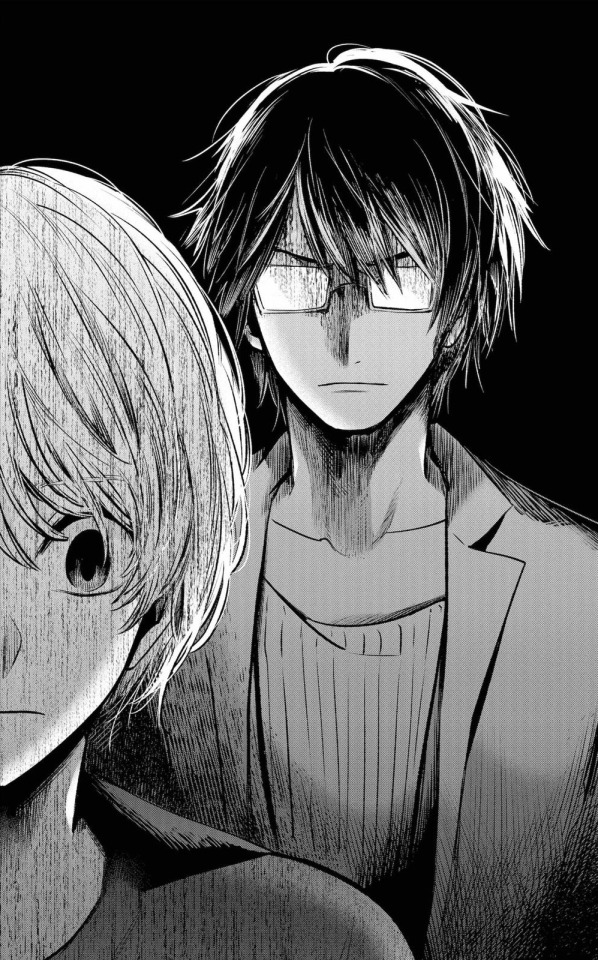
An apparition of Gorou in Aqua's mind berates him for enjoying himself when he couldn't save Ai, and Aqua begins to have a panic attack. As the next chapter opens, Aqua leaves the rehearsal session to go rest, but Ai's death and the Gorou apparition haunt his dreams:
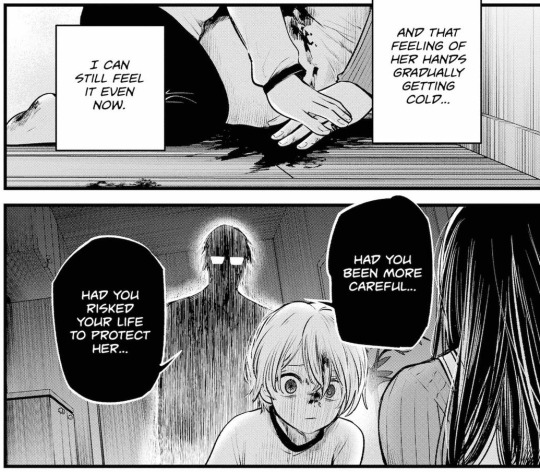
This is the first time we directly see Aqua struggling with guilt over Ai's death. Of course, Chapters 11 and 12 show that he's strongly motivated to prevent Ai's tragedy from repeating with Ruby, and in Chapter 26 we get a hint that he feels some kind of responsibility for Ai's death:
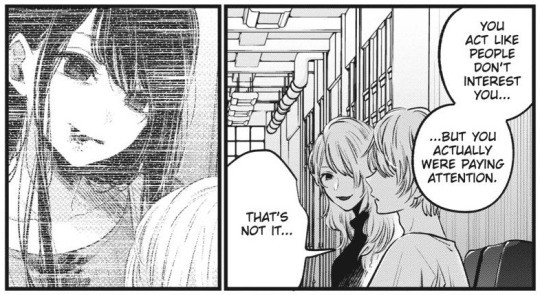
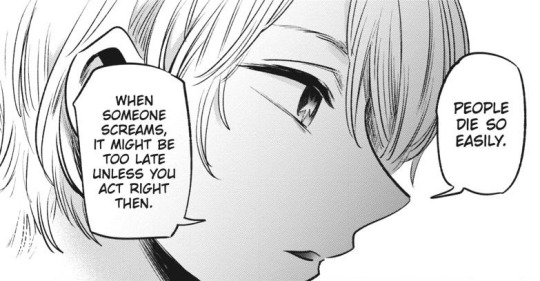
Guilt and self-blame are conspicuously absent from Aqua's extensive monologuing about Ai's death in Chapter 10, though. I think the in-universe explanation for that would have to be something like "the idea that Ai's death was in any sense his fault is too painful for him to even consider so soon after it happened" – and maybe that was Akasaka's intent, or maybe Aqua feeling guilty just wasn't part of his plans yet. Either way, though, as of Chapter 50, Aqua's guilt is very much present and here to stay.
Notably, Chapters 50 and 51 are also the first time that the manga plays with the idea of a Hoshino twin's past life as a separate entity from their current self. (For instance, Aqua has always referred to Gorou in first person in his inner monologue, and likewise with Ruby and Sarina.) I think it's clear that Aqua is not literally being haunted by Gorou's ghost here – for one thing, Crow Girl strongly implies in Chapter 75 that Aqua's soul is Gorou's soul – but the split does make sense symbolically and psychologically for Aqua. After all, Gorou was an adult who took on the responsibility of caring for Ai and helping her achieve the family life that she wanted...
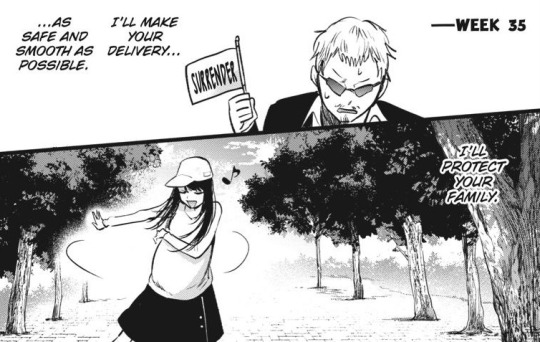
...and when that life was ripped away from her before his eyes, it's understandable that he'd feel like he ultimately failed her. But Aqua Hoshino, who was only three years old when Ai died, is someone who obviously has no business feeling guilt like that, and indeed no one holds him at all responsible for Ai's death. So Aqua's guilt manifests in his mind as Gorou, his past life standing in the way of him properly living his current one.
After Chapter 51, we next see the Gorou apparition in Chapter 55, just before Tokyo Blade's opening performance. Aqua prepares for the show by staring at a picture of Ai on his phone and recalling her death, reaching the verge of a panic attack – and summoning the apparition.

Here, Aqua reciprocates the apparition's practice of referring to him and it as separate entities. (Which makes this the first and only time as of Chapter 136 that Aqua internally refers to Gorou as a separate entity, if it counts.) Even so, though, the guilt that the apparition embodies is intermingled with the emotions that Aqua consciously experiences:
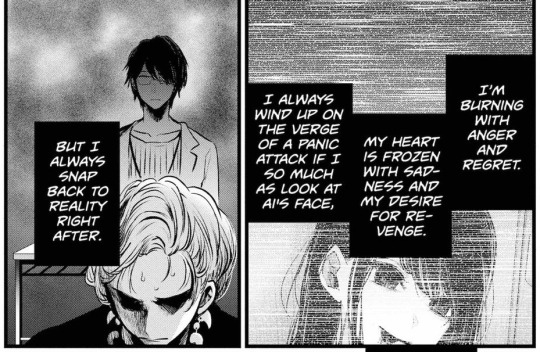
And why is Aqua practicing calling his own trauma to mind like this? So he can use it for emotional acting, of course. (Pretty messed up.) We see the fruits of this in Chapters 64 and 65, when Aqua's character has to react to the apparent death of the one for whose sake he fought, and Aqua himself is in about as much turmoil. But this encounter with the Gorou apparition – the final one of the arc – goes a bit differently from the others.
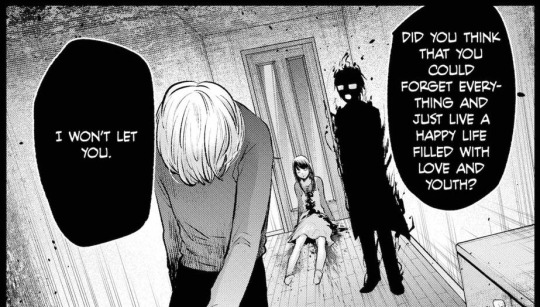

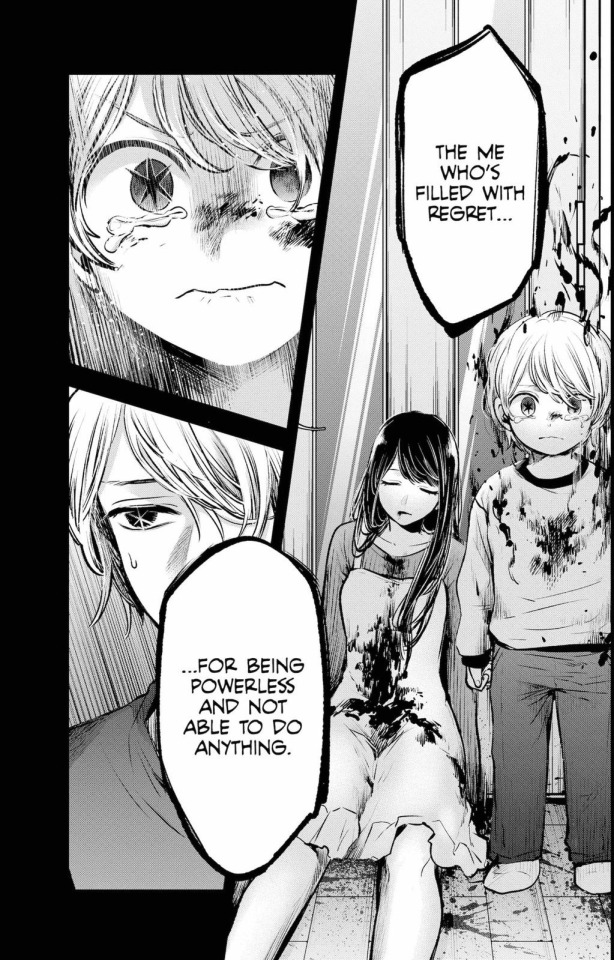
This time, Aqua refuses to separate the apparition from himself, instead recognizing it as a manifestation of his very own past trauma. Correspondingly, the apparition's form as Gorou – an identity that Aqua has left behind – dissipates to reveal Aqua as he was in the immediate aftermath of Ai's death. Aqua still maintains some conscious distance from those feelings, represented by his current self existing separately in the scene and handling the narration – which makes sense, since he's trying to control the feelings for acting purposes. But they're nonetheless his feelings, and he takes advantage of that to fuel his acting.
Also notable are the apparition's own words here, which frame Aqua's revenge as an obligation that he has no right to be happy before fulfilling – presumably because of his failure to save Ai. Aqua's revenge quest, it seems, is motivated in large part by his guilt; making himself miserable living only for revenge is an attempt at penance, and all of the blood and suffering that he intends to extract from Ai's murderer is an attempt to repay Ai for everything he let her lose.
And then Chapter 68 happens. One of Aqua's DNA tests has revealed that he and Taiki Himekawa share the same father. Taiki's father is Seijuurou Uehara, who is dead. Which means Aqua's father is dead, and avenging Ai is no longer possible. Right?
That's certainly what Aqua chooses to believe. Because if avenging Ai is no longer possible, then it's no longer obligatory, and Aqua doesn't have to make himself miserable anymore. He's finally free to do the things that make him happy without being crippled by guilt about how he should be obsessing over revenge instead.
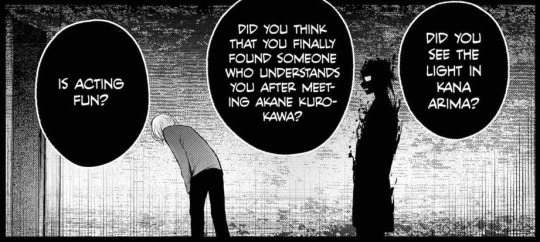

Also, since Aqua is no longer bound to penance for Gorou's failure to protect Ai, thoughts of Gorou's life don't demand nearly as much space in his mind now. There's really only one loose end from his past life left to tie up:
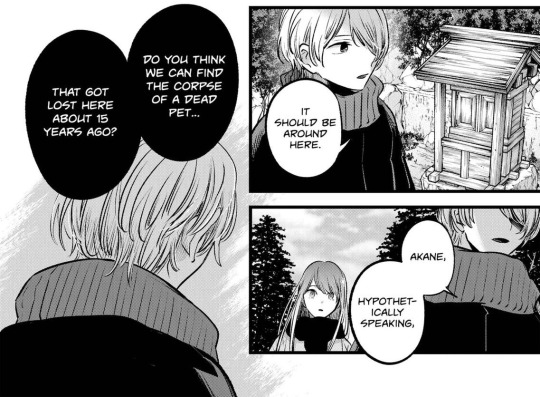
Of course, the corpse that Aqua wants to find is Gorou's. He stops looking for it once Akane points out that the "pet's corpse" is probably either buried or scattered – but when she stumbles on it later anyway, he's very grateful to her:
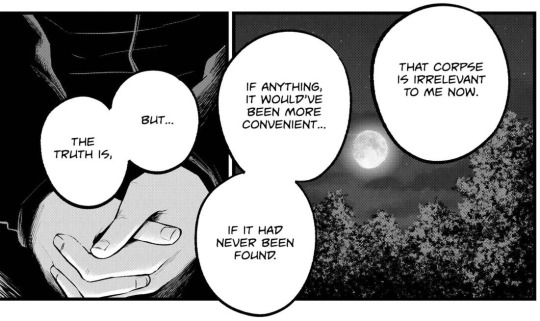

By the way, it seems like Aqua means it when he says he always wanted Gorou's corpse to be found. This monologue of his echoes one in Chapter 7 of all places:


And as it happens, on the very next page, we see Aqua ask Ruby about her past life – a conversation which swiftly ends as follows:
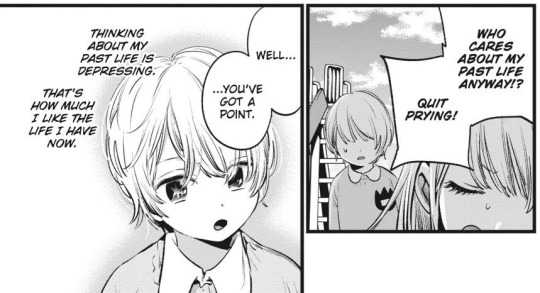
In general, it seems like Gorou wasn't a very happy or fulfilled person, so it's not surprising that even aside from carried-over guilt, Aqua is motivated to forget about his past life in favor of his new one as a young person full of potential. I'm inclined to see his desire for Gorou's corpse to be found as at least partially a desire to symbolically say goodbye to Gorou; to see Gorou confirmed to the world as dead and laid properly to rest.
Speaking of carried-over guilt, Chapter 75 reveals that Gorou was at least implicitly made to feel guilty by his maternal grandparents over his mother's death from giving birth to him. And then in Chapter 78, when Aqua is talking to Akane, he blames himself for her having seen Gorou's corpse even though she ended up finding it by chance. He even claims that he tried to manipulate her into finding it for him when Chapter 75 pretty clearly shows him giving up on it being found. Akane comments a couple times in Chapter 78 that this behavior is typical for him:
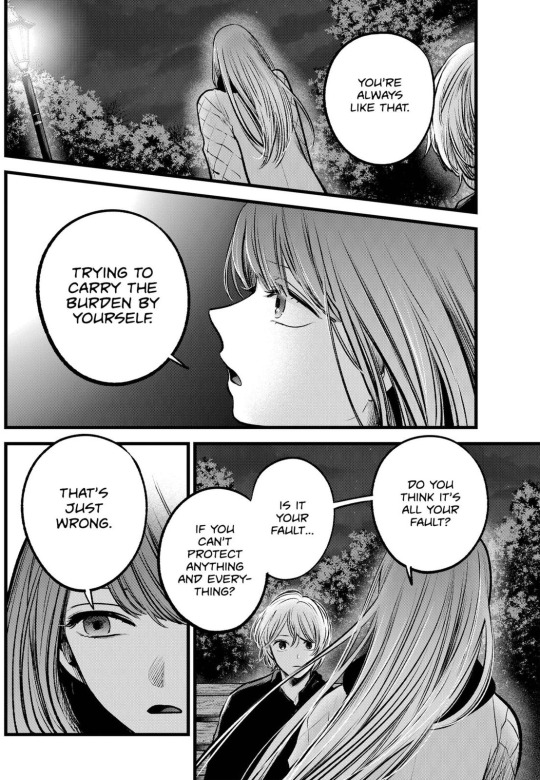
So it seems like the Takachiho arc is intentionally establishing "feels guilty and responsible for things that aren't really his fault" as a general character trait of Gorou/Aqua, stemming originally from how Gorou's grandparents made him feel about his mother's death. (Chapter 122 takes this trait significantly further by portraying Gorou/Aqua as so guilty about being unable to save Sarina that, despite suspecting Ruby was Sarina, he spent his whole life as Aqua in denial of it. Please forgive me if I smell a retcon.)
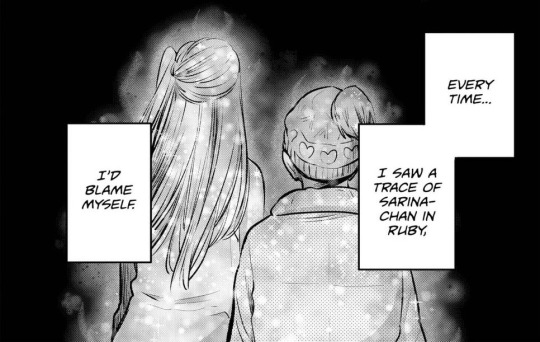

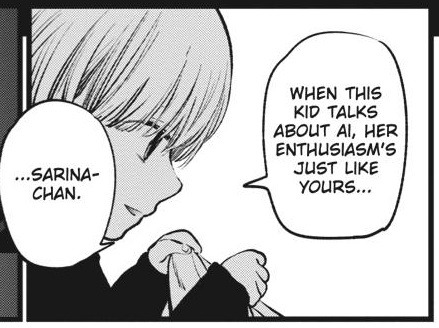
Let's continue with the story now. Aqua spends about a year in-universe believing that Ai's killer is dead – but then in Chapter 95, Ichigo points out to him that Seijuurou Uehara died before Ai moved to the apartment where she was killed, and the DNA test doesn't eliminate the possibility that Uehara isn't Taiki's biological father. Aqua begins spiraling, and we see the Gorou apparition confront him for the first time since Chapter 65. Alongside it is a separate apparition taking the form of young Aqua; it seems to embody sadistic hatred for Ai's killer while Gorou embodies Aqua's guilt.
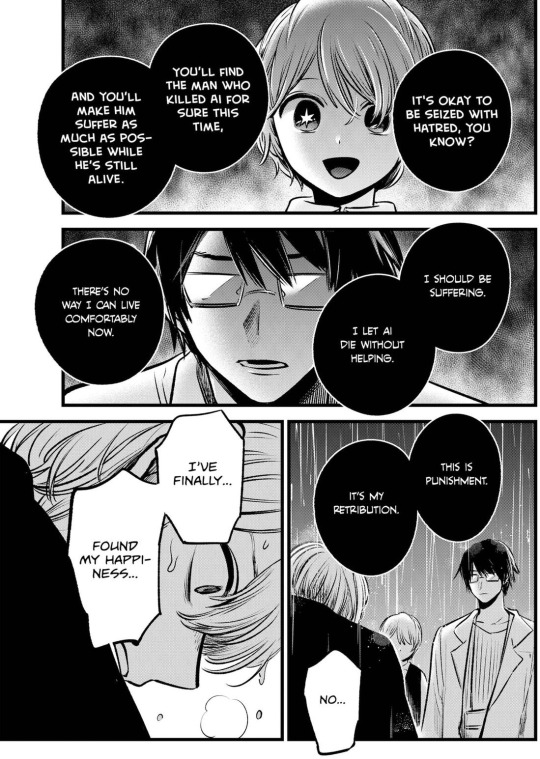
I think the logic behind the two distinct apparitions is this: the reason why these feelings manifest as apparitions separate from Aqua in the first place is that they're egodystonic feelings that he doesn't want to feel, and as of late he's been trying to avoid feeling both his guilt over Ai's death (Gorou) and his hatred for her killer (young Aqua) for the sake of leading a normal happy life.
Aqua now consciously believes that he cannot pursue revenge and be happy at the same time, but he struggles with which one to choose. He comes to Akane for advice in Chapter 97, probably hoping that she'll tell him to forget about revenge – but instead, she tries to deal with the culprit herself behind his back. He catches her, though, and reveals that he's made his decision:
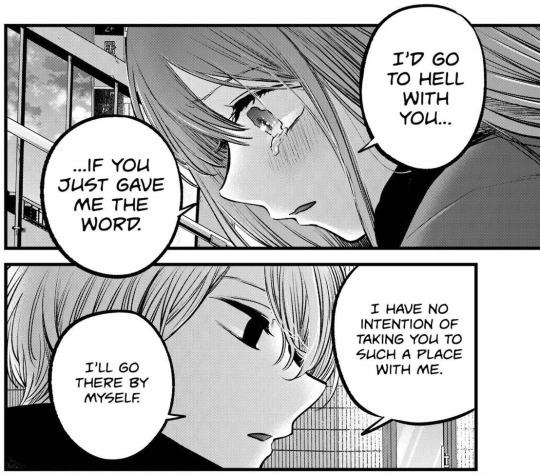
And when he says he's going to hell, he may not be exaggerating. His renewed pursuit of revenge is much more directly self-destructive than before; he deliberately pushes away Akane and later Ruby as well, consciously intending to die or at least ruin his life in the course of revenge, and not wanting his loved ones to suffer when it happens.


(For what it's worth, this is not the first time we see Aqua consider dying. There's also an instance in Chapter 10, though that one is framed more as Aqua just feeling completely lost in life without Ai.)
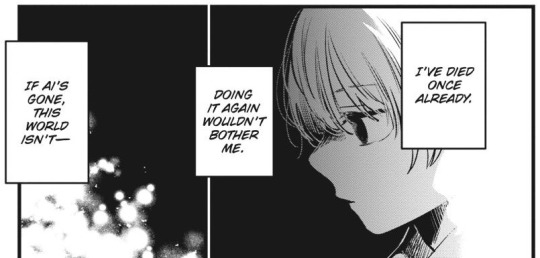
Aqua's renewed revenge is also somewhat more consciously sadistic than before, I think; despite knowing the culprit's identity, he puts off killing him for the sole purpose of executing a plan to make him suffer as much as possible (see Chapters 99 and 108). Granted, that plan was one he came up with when he was little (Chapter 108), and wanting the culprit to suffer was always part of his conscious motivation (Chapter 13), but just as often he'd state his goal as simply killing him (e.g. Chapters 10 and 52). Black-starred Aqua, however, displays a level of intent to make the culprit suffer while alive that was previously only the territory of the apparitions from his mind's dark corners.
Speaking of the apparitions, all of black-starred Aqua's talk about going to hell and making Ai's killer suffer and "I've thrown away the naive thought about being happy" (Chapter 108) seems like it should be right up their alley, but after Chapter 95 (and as of Chapter 136), they're nowhere to be seen. I think this is because Aqua's guilt and hatred essentially won the battle for his ego that occurred in Chapters 95-98; they now manifest directly in his thoughts and behavior instead of as apparitions. Black-starred Aqua consciously believes that both he and the culprit deserve nothing but suffering for their roles in Ai's death. It's Aqua's desire to move forward that's marginalized in his mind now.
Perhaps relevantly, in the panel after Ruby bids Aqua farewell in Chapter 106, Aqua himself appears as a black silhouette – just like the Gorou apparition in several places in the Tokyo Blade arc. And then in Chapter 122, when Aqua has discovered Ruby's past identity and is trying to convince her to stop worrying about revenge, this exchange happens:


It's possible that Aqua here is mentally "being Gorou" or speaking as him only as a reaction to this specific situation – but given everything else we've talked about here, I can't help but suspect that this reflects a stable feature of black-starred Aqua's self-concept. Black-starred Aqua thinks of himself as Gorou, the man who failed Ai. "Aqua Hoshino" is just a mask that he's been wearing – once to hide from his responsibility, and now to fulfill it through his revenge plan. He doesn't deserve to sincerely call himself by the name that tempts him with a chance at a happy life.
@aihoshiino points out that Aqua has been acting somewhat awkward around Ruby since the mutual past-life reveal (e.g. in their talk in Chapter 132), and theorizes that part of the reason for this is that Ruby is now seeing Aqua as Gorou, but Aqua doesn't want to be Gorou. Given what I've been theorizing here, though, I think Aqua's discomfort is more precisely because Ruby is seeing him as Gorou and loving him for it. From Ruby's perspective, Gorou is wonderful and it's wonderful that she's been reunited with him. But from Aqua's perspective, Gorou let Ai die. Gorou is a failure. Gorou doesn't deserve Ruby's love. (He doesn't want her love in a romantic sense anyway, I think, but he feels he doesn't deserve any kind of love from her.) And he feels especially bad because he's letting her love him regardless for the sake of the movie revenge plan, which eventually involves his destruction. He's using her for a purpose that she'd never agree to and that will leave her heartbroken if it succeeds – even if he believes that what she loves is a lie.
#oshi no ko#aohl talks onk#aqua hoshino#gorou amamiya#onk spoilers#long post#ptsd cw#death by childbirth cw#suicidal ideation cw
30 notes
·
View notes
Text
How am I supposed to to enjoy Stardew Valley while it sounds like gunshots outside? I hate the 4th…
PTSD Trigger Warning: Viewer Discretion is Advised
I’m not going to try and not go into too much detail.
Back in 2019 my uncle committed suicide late at night. I was awoken at night to the sounds of men shouting. There there was a gunshot. And then there was nothing but silence.
A while later there was a knock on the door and I knew it had to be the police. I wish I could forget that godforsaken gunshot sound…
#ptsd vent#ptsd cw#it freaks me out so much#my imaginative mind doesn’t help#I love Stardew Valleys music#those stupid bangs and pops are so annoying
54 notes
·
View notes
Text
MORE TRAUMA LEON HEADCANONS!

He 100% does not understand affection
Never feels clean. I will not explain this I just feel like he always feels ewww
Has problems eating, not anorexia just can't make himself eat, he feels gross
Obsessively works out
Tried to kill himself MULTIPLE TIMES
Never has his back turned to anyone
Horrible night terrors
#leon kennedy#leon resident evil#re4 remake#leon s kennedy#leon kennedy re4#leon trauma#trauma#sad headcanon#re4 leon#leon headcanons#headcanon#ptsd cw
20 notes
·
View notes
Text

What are you trying to forget?
#weirdcore#disassociation#unreality#dereality#derealization#cw#ptsd cw#ptsd#liminal#dreamcore#paranoia tw#eerie
135 notes
·
View notes
Text
A PRODUCT OF HER ENVIRONMENT: AN ANALYSIS ON THE CRUX OF MARI'S CHARACTER, AND THE INTENTION BEHIND IT. CONTENT WARNINGS ARE AS FOLLOWS— MENTIONS OF ABUSE, PTSD, SELF-DESTRUCTIVE BEHAVIOR / EMOTIONAL SELF HARM, MENTIONS OF THE JUSTICE SYSTEM, MURDER, VIOLENCE, AND DEATH.
as a preface to this analysis, i want to make it absolutely clear that this, by no means, is a meta to excuse or justify mari's behaviors, actions, or horrific activities. in the same breath, i also want to emphasize that it isn't something that will go ignored within her character, and should be dealt with in a very cautious, careful, and cognizant way. mari's experiences and trauma have shaped her significantly, and while there are reasons behind what she does, it does not make any of it right. this meta is centered around the question and purpose of mari’s character, as well as emphasizing factors of mari beyond the antagonist / villain pieces. it is by no means intended to excuse her, but hopefully allow us to empathize and see her in a full light.
mari is, from beginning to end (of any plotline), a product of her environment. her story could be seen through a lens of her trajectory being a grimdark coming of age story, and to some extent, that's true. however, then the question becomes: did mari ever grow up?
the beginning of the exposure to dysfunction, abuse, and relentless horror began at an incredibly young age for mari. her desensitization to extremely destabilizing circumstances started before she was even 10, and only increased in severity as the aforementioned circumstances worsened. if we follow along her timeline, we witness how harm and / or violence becomes such a consistency in her life (in whatever way that was) that the existence of it becomes cemented in. her surroundings being a format of shaping, molding, and crushing her down to size continually, means that when we ask if mari dai grew up, we also have to ask how much of her childhood was actually rooted in a development of self, or rather, a development through survival.
in a horrific and real way, mari never knew what it meant to be mari dai. she grew up in a household that took those initial pieces of her, waiting to blossom, and let them (or forced them to) shrink back into nothing but roots. these are things that are still inside of her, no matter the verse, but depending on how they're fed and nourished, and how much mari is willing to expose them, they can either grow, or remain stagnant. even if her getting to explore who she was wasn't necessarily going to summer camp, or having sleepovers, her exposure to personal development was slim to none. those pieces of baby mari were fragmented, and eventually hidden inside of her heart. the actual ability to make them into something more than that sat at zero for a great majority of her life. mari walked into this world, and had books about animals, the space between her elementary school and home to look at insects at, and jiujitsu classes. she had one brother to nurture and care for (until she didn’t), a mother who she eventually learned she needed to accept the risks if she was going to approach her, and a father that she avoided at all costs for her own survival. her world was incredibly small. her options were very limited. what she knew was immensely isolated. she learned, very quickly, how to be the caretaker, the forgiver, the secret keeper, the comforter, and the collateral damage all at once.
if we were to look at current day mari, we see contrasting pieces of that younger version of self. current day mari is manipulative, limits connection, and repeatedly tries to sever the ties to her former self (as seen through the god delusion). she is violent, mean, cares about seemingly no one, and doesn't try to make friends, nor even tell truth about herself. quite a lot of this is due to trauma, and instinctive reflexes to "protect" herself, but it's incredibly important to question that if those behaviors are her protecting herself, then what does that mean she is protecting? if those behaviors are simply compulsive reflex to her experiences, and not wanting them to happen again, then by proxy of such, there is something behind all of that. more importantly, there is someone behind all of that.
mari's formative years were rooted in her trauma. for individuals who experienced impact points at older ages, sometimes it can result in thoughts similar to "what has happened to me," or "why am i reacting like this." for mari, this is not a thought. she was raised in such an isolating environment, and then surged herself into the abyss, and kept herself in a dark she knew. mari does not wonder what has become of her, because her development was so flooded with these continual experiences that shaped her. to her, she simply grew up. she never had an ability to understand or see who she could be without those circumstances or experiences, and identifies those former pieces of self as her simply "being a kid." in mari's mind, she once wanted friends, tried to make connections, and felt like she didn’t fit in. she was sad that her parents were so loud, or her house was so scary, yet still hopeful mark was going to take her with him when she was younger. but then she “grew up,” “got real with herself,” and "wasn’t so childish” about things anymore, which translated out to committing arson, pushing back at her parents, drinking / doing drugs to "deal with it," gave up hope on mark, and eventually her own violence worked alongside it. to mari, that's just not being a kid anymore. she doesn't have the groundwork necessary to be able to identify that not only her childhood was taken away, but her adulthood was, too.
on one hand, mari did grow up. she grew up relentlessly, quickly, and without mercy. she grew up harshly, brutally, and fighting for her own survival. but when we look at the core pieces of who mari dai used to be, before she fully and completely began to fragment out into wielding her life as a weapon, we still see these pieces remain. we still see the young girl who moved snails out of harm's way, because we now have current day mari doing the very same action. we still see the six year old girl, hiding under her covers and peeking through a butterfly pop-up book with a flashlight, because mari still takes the time to go butterfly hunting. we continue to witness glimpses of middle school mari dai, who just wanted to play music out loud (and subsequently, couldn't for her own safety) when we see current day mari turn her radio up to astronomical volumes in the car, regardless if she feels she cannot do the same in her own home. we see flashes of mari dai, who held out hope and love for a family that never existed, in the way she loves now — endlessly, boundlessly, and to extreme extents. mari loves like a child loves. she forgives the way a child forgives. she enjoys plenty of activities with the wonder and awe a child would. we catch glimpse after glimpse of that little girl, peeking out from where mari has hidden her, through arts and crafts, aquarium visits, giving stuffed animals to children at theme parks, or how she loves.
regardless of how we see current day mari step into the bloodshed, brutality, and violence, and wield it as a method of control and safety for her psyche, we also see something else underneath it. if we're to say that mari's background is a coming of age story, then we have to confront if this is all she is capable of. is that little girl, sat right where she was hidden, incapable of growing up? is mari, as a person, past the point of no return? the truth is, is that mari being a product of her environment doesn't end when her background story does. mari being a product of her environment extends and flourishes in interpersonal dynamics with other people. that little girl wanted friends, and current day mari does, too. she wanted love, care, and compassion. she wanted support, encouragement, and things to look forward to. however, what mari has associated with looking forward to or expecting from those wants / needs is so rooted in the dark that she knows, but her being a product of her environment (from beginning to end) means that this doesn't have to remain. it doesn't have to stay the same.
mari is incredibly ingrained into her behaviors. she is stubborn, and combative. she is closed off, and hard to get in with. she doesn’t see people as people before a moment of significant connection. she's quick to recoil, abandon, or kill. overall, mari presents like she is someone who is stagnant in some areas, and more moveable in others. she seems as if she's someone who you need to pick your battles with. but familiarity, for mari, is what she surrounds herself with. these high adrenaline, extremely dark, violent, and harmful scenarios are what she understands. it is everything the world has taught her about. mari struggles, time and time again, to realize that just because she understands the darkest pieces of the world, doesn't mean she understands the rest of it. she often goes through dynamics where what she's understood from her past, and what she can begin to imagine for her future, is a massive adjustment and difficult reconciliation for her. coming to terms with not limiting herself to this very strict set of guidelines is terrifying. walking into a space that she doesn’t truly understand what she’s walking into is intimidating. she, more often than not, boxes herself in. but when we set other players into motion, or when mari allows people in, the concept of her life can begin to transform before her very eyes. it can expand to become something new entirely, for better, or for worse.
none of this is to say that mari is someone who will be capable of getting a happy ending tied up in a bow for her to ride off into the sunset, nor is it to say that she suddenly will wake up and have that disconnect from not seeing people as people removed from her psyche. there are certain pieces of mari that will always remain, both past and present. her upbringing and experiences have created levels of indelible damage. there has been irreversible harm to both mari herself, and others. impact points will still remain impact points. scars will still remain scars. the ugly reality is that mari does not have the accessibility, nor resources available to begin to receive help, even if she was in any sort of place to seek it out. all of this is simply more to say that mari is not past the point of no return. she is not too far gone, nor is she incapable of reacquainting herself with these underdeveloped pieces inside of her.
for a character like mari, who is saturated in crime, horror, and built around the injustices of the so-called justice system, it is essential to look at her through a nuanced perspective in order to understand exactly who she is. the world did not give her a chance, and we must consider what that means in a grander perspective. she's a dead-girl walking, so what would it mean for her to resurrect those pieces of herself? what happens if her resurrection isn't about being someone different, but being the person you could've been? mari is a ghost story if you let her be, but she is not doomed to the narrative, and that is the point. the crux of mari's character is a question to our own conscience and world around us. who do we condemn, and who do we not? who do we see as unsalvageable or unsavable? where do we draw the line, or is there a line to begin with? do we only see mari as her current day self, or do we mourn for baby mari, too? it is not too late for mari to find something different, but how does she do that, without resources? how does she relearn life, if no one helps her?
mari dai, given the right circumstances, can grow up. so, now our question becomes: how does she make her first steps to try?
#characterization.#THEE mari meta of all time#has to be posted otherwise i'll die#murder cw#violence cw#abuse cw#ptsd cw#emotional self harm cw#death cw#ask to tag
6 notes
·
View notes
Text
𝐓𝐑𝐀𝐔𝐌𝐀. — Let’s talk trauma. It’s pretty obvious for anyone who has read Throne of Glass that Aelin suffers through various kinds of traumas and a degree of mental illness through the series – I’m going to break down the main ones I’ll be referencing throughout my own writing, featuring spoilers. It’s worth noting that even with the below, Aelin never lets the majority of this show. Most of the time, this will feature in introspection – please never presume your character is aware of everything, though she’s likely to show hints and symptoms along the way. She keeps the walls up, and holds trauma close.

— oo1. Post Traumatic Stress Disorder:
This does not occur from one isolated incident in her life. There is a long series of history here dating back to her childhood and the trauma of being afraid of her own powers and the extent of her abilities, which we see the King of Ardalan take advantage of and weaponise against her to make her paranoid extend to her own form of control – this manifests during her adolescence and training in Wendlyn with Rowan, where she is terrified to truly unleash without hurting anyone. It’s severe training that allows her to overcome this particular fear.
We then have the trauma she undergoes in her time in the Assassin’s Guild – what is essentially grooming from Arobynn, the deep seated trust issues she forms after his betrayal, and also from the atrocities she commits as Celaena Sardothien who I firmly believe she has partially disengaged from our own self as Aelin. We even see her reluctance later to adopt the identity again, and the visible difference in how she acts when she does slip back into the character ( though if I’m honest, this a whole meta on its own ).
The most obvious of her trauma occurs in the Salt Mines of Endovier – we know she spends one year in the mines where most only survive three months within the prisons there, endured frequent beatings, and is responsible for killing over twenty-four guards on the anniversary of her parent’s death, the same day she attempt suicide. We know during this time she witness physical, emotional, and sexual abuse, as well as being exposed to unbearable living conditions, the verge of starvation, and being broken down so physically that most would have died long since. It is the Salt Mines of Endovier that generated her absolute hatred of slavers, and her fear of whips ( which we reference when Rowan threatens to lash her in her disrespect during training, and later when Maeve uses this fear against her ) ; even now she can’t stand the sound of a lash.
Let’s then factor in the experience she has at the hands of Maeve, and specifically Cairn. We know in that time that she endures broken bones, kneeling in broken glass, being flayed, at minimum – the extent of what she goes through is only hinted in various chapters, and witnessed by Fenrys. I think the most interesting moment of this abuse is when he threatens to use fire against her, and we see a moment in which Aelin realises if he uses fire against her, she will fear it, and in doing so, fear part of herself. I think this introspection confirms she knows at least to some extent how traumatised she is, and what wounds linger.
At the end of all of this, she has a long list of triggers, and a very damaged psyche ( largely masked by her sarcasm and her attempts to push people away ). Even after the series ends, that trauma lingers – and factors into each of the issues I’ll list below. Her months spent disassociating during her time with Maeve ( no doubt a tactic partially employed in past torture ) mean she does occasionally revert to that mindset without realising, and most commonly in silent communication with Fenrys without realising. Touches without her consent – ie. coming up behind her without warning – likely yield a violent response due to shock. Crowds place her on alert because she’s so used to looking for danger. This kind of trauma manifests in social withdrawal ( not externally, she’s good at a mask, so it’s internal – she’ll pretend she’s fine while suffering in her own head ), emotional detachment on occasion, and throwing herself into distractions like physical training in effort to remove from the demons in her mind. Time does not heal this trauma entirely, though time does bring closure and allow her to live with it.
— oo2. Insomnia.
We already see this several times in canon, that where most sleep, Aelin does not. Most commonly her form of self -soothing when it comes to her own insomnia is to render herself exhausted – not necessarily just by her daily activities, but most of the time we see her roaming at night and often times her plans and plots take form by night, where she will spend hours on end employing tactics when no one else is awake. Most of the time, it’s only by utterly exhausting herself that she manages to find some form of rest. More commonly than not, particularly after her time within captivity in Kingdom of Ash at the hands of Maeve, she has nightmares, and can’t discern if she’s awake or asleep because of the months spent in that nightmare like state. She wakes, and for those few moments she doesn’t know if she’s in the Iron Coffin, or if the darkness is nighttime ; it’s only herself that can bring her mindset back and remember she’s not there, that her dreams are only dreams, and that she’s long since gone from their clutches. And then it’s the realisation that she’ll have the same fears in the next day when she wakes, and however tired she might be, she begins to loathe sleep.
I think, again, this is something that eases with time ; Terrasen is never completely dark, even in the night time, so when she awakes the moon and the stars are always bright enough to pave the starlight through her chambers and ease the fears. But it’s only in time that she begins to properly find some form of rest.
— oo3. Cleithrophobia.
I’ve been thinking quite a lot about whether or not she suffers from claustrophobia and cleithrophobia and why she may be one more than the other. Where claustrophobia is a fear of enclosed spaces, the latter is a more specific trauma – that is, the idea of being trapped in any confined space, unable to escape.
After three months spent in an Iron Coffin, with a mask on, literally unable to move, her fear manifests in the second far more than the first. Where claustrophobia indicates an irrational fear of small spaces, her own terror is something based on experience. It’s not the actual space that bothers her ( though I doubt she loves it ) but the very specific situation, that she can’t get free or she can’t escape. Any remnant of that situation likely triggers the same response – panic, in her chest, an almost manic desire to get free, eventual disassociation to cope with the scenario. To put it bluntly, it’s not a situation she ever willingly enters into – small spaces are fine, but if the door were to close behind her, or something blocked her getting free, it’s a deal breaker.
— oo4. Thanatophobia.
To be clear, Aelin does not fear death for herself – it’s not something that makes her uncomfortable, given she knows how many people she’s lost along the way, and I believe part of her does have full faith she’ll see them again after her own death. However, the deep seated issues she has in not being able to save the ones she loves, particularly after witnessing some of those deaths, is something that she finds manifested into genuine fear. We witness it constantly in her self sacrificing behaviour – it’s not self destructive as such, but it’s demonstrated in the fact she places everyone else as more important than her own life. We see it when she admits to Rowan she can’t lose anyone else ; it’s not as shallow as not wanting to lose loved ones, it’s that she can’t deal with the loss again, which manifests in her seeing danger to loved ones even when there is none.
— oo5. Body Dysmorphia.
This develops entirely after Kingdom of Ash, and I think it’s so important to acknowledge here that Aelin was very, very attached to her body. We see her reference her scars repeatedly through the series, the fact that each means something to her, and it helps ground her – physical marks tell her a story of what is real and what was not. I honestly believe this is why she’s so traumatised by the fact her torture at Cairn’s hand results in her entire body being remade over and over for the course of months, that she doesn’t know what was done to her, what was real, what never happened ; there’s nothing to track each injury to the matching wound. Likewise, the years she spent in that body are now remaining only in her own mind.
Not to mention in terms of her physicality, she is suddenly a stranger in her own skin – she knew what her strength was, what her body could handle, had built thick skin, had muscles toned by years of her own training. Suddenly she’s in a body that is untrained, and it’s a blank canvas.
I truly believe this results in a disconnect between her own mental state and her body, and a hypercriticism because her body isn’t as trained, isn’t as fit, isn’t what it was before. Even after resuming her training with Rowan to self correct this, it’s not good enough in her own opinion – it isn’t the same as it was before. Factor into it then that she then loses her mortal body entirely when she forges the Lock ( which is traumatic on another level because her fae form is the one she was reluctant to take for years, and suddenly she’s mourning the loss of her human self, as well as everything she’s been through ), and it takes literal years for her to feel like she’s settled into her skin again in any way shape or form.
#ptsd cw#long post cw#dysmorphia cw#koa spoilers#repost from sora's ramblings when i first made this blog#i. character study. » one does not deal with her ; one survives her. «
6 notes
·
View notes
Text
At some point Ed and Stede are going to explore kink and do a scene where they think it might be fun if Ed "gets in trouble" and is "punished" a bit. You know. For fun. Not serious.
And Ed is going to Shut Down and safeword and start crying. And also possibly he's going to want to tuck himself away and hide for a little while.
And Stede is going to be so understanding. He's going to realize immediately that this was a mistake. And he's going to be just So Gentle and assure Ed that he's not mad and that Ed's not actually in trouble. And that Stede would never, ever, ever hurt him.
And Ed is going to emerge. And he's going to let Stede hold him while he cries. And he's going to calm down. And they'll talk more about it later but for now Ed is just going to be held in the arms of the man who loves him.
68 notes
·
View notes
Note
awkward or fear ^-^
uncomfortable bondingㅤㅤㅤㅤㅤㅤ∘ ˚ ( accepting! )

» fear — your muse witnesses my muse in a state of fear.

ㅤsometimes all it takes is one thing, one tiny little thing, to make you feel small again. something as simple as a familiar cadence, a similar voice, even a certain stance or flashing of eyes, is enough to take you from standing your ground to cowering and backing away. eyes wide, chest tight, body frozen; you're eight years old again and you're petrified of the man towering over you. you're eight years old again, and you run. you run and you run with no destination in mind, no idea where you even are, but you keep on running anyway. all that matters now is putting distance between you and him.
ㅤa hand reaching out and catching their arm drags them to a jerking halt and reignites the flare of panic in their chest when it pulls them down a narrow alleyway. sure that it's him, they try to tear themself free, thrashing and writhing and yanking with all the desperation of a trapped animal. they don't realize that a strangled cry has even torn free of their throat until another hand slaps itself over their mouth to cut it short. breath catching under the suffocating weight of their own fear, byan continues to struggle, reaching out blindly for wrists, shoving and pulling and doing everything in their power to remove the hands from their body.
only when their back is pushed to the wall and the hand wrapped over their face forces their head to move in such a way that they're looking directly at their attacker do they hesitate in their distressed grappling. only then does the voice of the other finally hit their ear, his hissing for them to calm down and his shock of pink hair drawing recognition into wide, fearful eyes.

kitty.
ㅤㅤ—kitty? what's he doing here?
#hatesdogs#━━ ˟ ⊰ ✰ answered: ic ⋮ i am a vulture that feeds on pain.#i had such a hard time picking between the prompts ngl#awkward was gonna be byan like. spraining their ankle in their stupid platform boots which would've been v funny#but idk i felt compelled to take the more serious option bc i want these two to REALLY bond yk?#yeah. :)#ptsd cw
2 notes
·
View notes
Text
Prompt #10
CW: PTSD episode
The hero put down the bat as they gazed at the villain. The villain shield himself, while his whole body was violently shaking. In reality, the hero had picked up the bat from a random trash can that sat in one of the dark valleys. He had not planned on hitting the villain with it, maybe, using it as a defense tool.
"Please...don't hit me. Please." He wept, his eyes slowly filling with tears. The hero backed away, confused.
"What?" He mumbled, frowning a bit to himself.
"Please, just don't hit me. I'll do what you say." The villain whispered, the words barely reaching the hero's ears. His eyes let out the water holding them. He kept whispering, 'Please'.
The hero gulped, as realization hit. The villain was having a PTSD episode. He bent down and reached for the villain's hands. The villain backed away, in fear.
"It's okay. I'm- I'm...not going to hit you. Please, look at me." The hero murmured, making sure to keep his voice gentle. The villain reluctantly lowered his hands. His face was filled with terror, and the hero wanted to caress it away.
"You're safe, okay? I'm not going to do anything to you." The hero said, his eyes filled with concern. The villain sat still, his body still shaking a bit. He needed time and space. The hero decided to give him that. And, stayed where he was.
❌Please credit me if you use this in your writing ❌
#writersworld#hero x villain#my prompts#writing prompt#writing#hero and villain#ptsd cw#story inspiration#story prompt#writing ideas
44 notes
·
View notes
Text
|| Breaking down Shadow and his trauma is just intense ngl.


It's rough
#﹙ ooc ﹚≻ × headcanons.#abuse cw#programming cw#derealization cw#unreality cw#dissociation cw#ptsd cw#ask to tag
3 notes
·
View notes